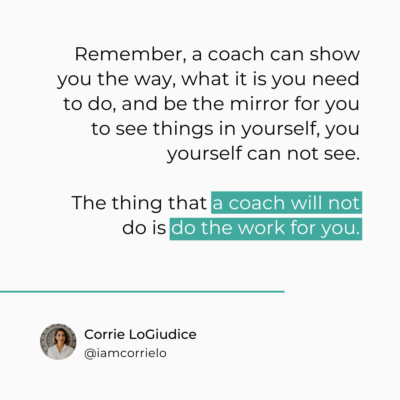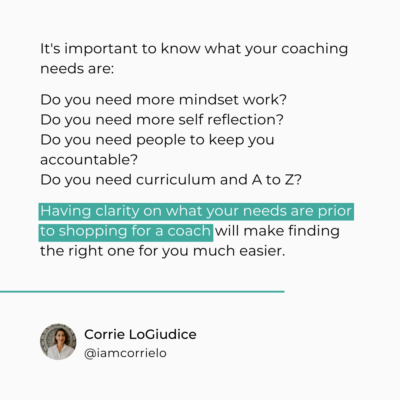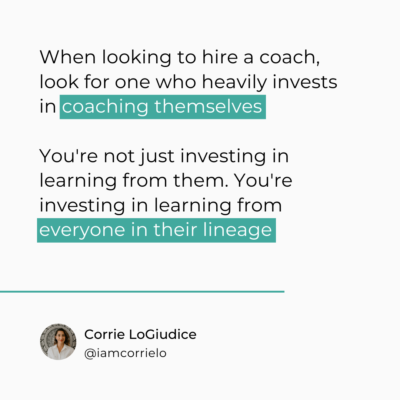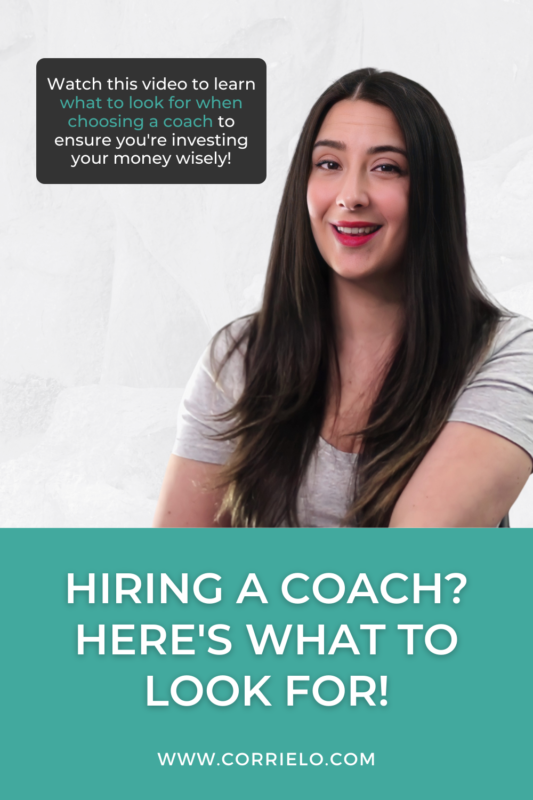Many people hire personal coaches to help them with everything – from personal goals, like relationships or health and wellness, to professional ones, like business and career.
But investing in a coach could be downright scary, too. For one, it can get costly without guarantees of return. And two, with so many coaches out there, how do you know which one is right for you?
If you’re in the market for a coach, but don’t know exactly what to look for, you’re in luck.
Today, I’m demystifying the process so you can confidently invest in the right coaching services for you and your goals. I will also share some tips on finding the perfect coach so you can fast-track your transformative journey towards success.
Interested in learning more? Read on.
Why should you consider hiring a coach?
There are many reasons why people seek out personal coaching services. One is to take the guesswork out of the equation. Another is to get the support of highly-trained experts who have been in their shoes.
In other words, coaching services can help you get clarity, motivation, and accountability you need to achieve your goals.
I, myself, have invested in different coaching services over the years. I’ve hired coaches to help me with marketing and other specific business goals. I also hired coaches to help me develop my skills (like professional speaking). I also had a chance to work with a coach whose expertise is digital wellness.
In fact, I have spent over $70,000 just to get the kind of support I needed during those times.
However, I can honestly say that each of those coaching services had a direct impact on my life, and they all helped me grow as a person. Also, those investments have now paid off for me in a big way. And I know that hiring a coach will do the same for you.
But of course, you need to know how to find the perfect coach first. So here are six things to consider before making your investment and hiring a coach:
6 Things to Consider When Hiring a Coach
1. Be clear on what you want to achieve.
Before hiring a coach, you need to be clear on what you want to achieve with it.
Looking for motivation? Have you thought about getting your goals back on track? Are you looking towards building your confidence?
If you’re clear on whatever you need, you can set your sights on coaches who specialize in those particular areas.
Think about it. If you have brain cancer, which doctor would you rather go to? A family doctor or a surgeon who specializes in brain cancer?
If you’re like me, you’d most likely select the one who specializes in brain cancer – because that specialist can help you with your desired transformation, which is curing your brain cancer.
Sure. Going to a general practitioner might work, but a specialist is better equipped with the knowledge and experience to handle your situation.
Hiring a coach is no different. If you’re looking toward building leads for a brand new business, you need to go to a coach specializing in marketing new businesses. If you have a more mature company but want to create leads to scale your revenue, you need to go to a coach who helps more experienced business owners do precisely that.
The bottom line is this: when hiring a coach, you must be clear on what you want to achieve. After that, you can go about finding the right coach for you.
2. Look for a coach who will help you see what you can not see yourself.
More often than not, when we’re stuck at something, we fail to see our own mistakes and blocks. And this is why we often fail to take the actions we need to take to get out of that situation.
An excellent coach knows how to help you realize your current reality so you can figure out what you’re doing wrong and why you’re failing to get what you want.
You see, coaches are not supposed to do the work for you. What they can do, though, is to help you know where you’re at and where you’re going. Then, they can help you find ways to get there in the fastest and most efficient way possible.
That’s why I firmly believe that there’s never going to be a coach that will guarantee you results – because ultimately, you are the one responsible for making those results happen.

3. Understand containers.
Containers are coaching packages – and that’s the term we often use in the coaching world. Currently, there are four basic types of coaching services that go into containers, and these are:
- Private coaching
Among all the types of coaching services, private coaching (or one-on-one coaching) gives the highest proximity to the coach, but it’s also likely to be the most expensive. This is because the coach needs to dedicate their time and attention to one client at a time.
With private coaching, a coach can work with you directly. Some of them do it one-on-one via Zoom call, some in-person, and some do weekend intensives. Other ones prefer to do Voxer-only coaching services.
The best part about private coaching is that you have direct access to that coach to help you work through the difficulties you’re having as you’re moving towards that desired transformation.
Private coaching is going to be a good fit for you if you are looking to do more mindset work or anything similar.
- Group coaching
Group coaching happens when multiple people with the same desired results converge in one venue (physical or online) to work on the same goal together through the help of a coach.
The coach’s main role in this setup is to manage the steps towards the desired result and ensure that the participants are moving towards the same goal simultaneously.
Group coaching is usually cheaper than private coaching, and it works great if you’re looking toward learning a new process or simply going from Point A to Point Z.
- Online courses
Online course courses are educational modules, mostly step-by-step programs, typically created by a coach to equip you with the knowledge you need to help you achieve your goals.
With online course programs, though, you typically don’t get the focused support you might get in the previous two containers. And unlike group coaching, you do most of the things on your own. The great thing about online courses is that they are usually less expensive than private coaching and group coaching.
Online courses could be perfect for you if you’re looking to learn how to do a process from A to Z. But if you’re looking for accountability, as well as being able to get feedback on your work, a group coaching program would be a much better fit for you than an online course.
- Hybrid programs
Hybrid programs are a combination of any of the programs mentioned above. They could be a combination of online courses and private coaching. Or, they could be a combination of any of the three above.
To give you an idea of a group coaching-online course hybrid, check out my own coaching program, The Validate Your Business Blueprint.
With hybrid programs, the lessons can be delivered online – through email or a learning platform – and students can work on these lessons at their own pace. On top of that, they also have access to things like group coaching calls or intensives, or even one on one calls within the program.
Of course, there are tons of pros and cons to all the different types of coaching programs, and you’ll need to think about which kind of program would be the best fit for you. What you can do is to do your research first before deciding. Or better yet, hop on a discovery call with all the coaches you’re looking to work with to get a better feel for what they offer and how they work.

4. Understand that a higher price doesn’t necessarily mean it’s better.
As you look into different coaching programs, you’ll notice that the prices can vary significantly. But there are really no clear rules about which is better – if you’re going to base these coaching services on price.
Because the truth is, the price can vary based on a number of things:
- The experience and reputation of the coach,
- The materials they’re using,
- The type of coaching services they’re offering
Above all, pricing depends on how much access you can get from coaching services. In fact, pricing is simply a gauge of your proximity to the coach!
If you need step-by-step information, one-on-one coaching at a high ticket price might be too much for you. In reality, you can get the same information in the form of an online course at a fraction of the price of what a private coaching program would cost you.
So, you need to understand that the higher price doesn’t necessarily mean that it’s best for you. It depends on your desired result, the desired timeframes you want to achieve it on, etc.
Of course, the most established coaches will command a higher ticket price than others. However, there are also very talented coaches who have years of experience in their related fields but are just getting started as coaches. So, if you want to make the most out of your investment, you might want to check them out.
5. Speak with several coaches before deciding on hiring one.
I recommend researching and interviewing multiple coaches before hiring one. Hop on to as many discovery calls or strategy sessions as you can to get a better feel for what they offer and how they work.
The way I like to describe this process of finding and hiring a coach is very similar to that of hiring a therapist. People need to feel comfortable with their therapist first. Otherwise, they won’t be able to fully open up and get to the root of their issues.
The same thing applies to finding a coach. You need to make sure that you and your coach are comfortable working with each other. In fact, I even tell my potential clients this all the time:
To be able to help them with their problems, I need to make sure that I am comfortable with them as they are with me.
So basically, working with a coach is, in reality, a two-way street. It has to work for both parties. That’s why all these calls and meetings with potential coaches are essential. So don’t skip out on this step. It’s crucial that you get a good feel for who you’ll be working with.
6. Make sure that the coach you’re about to hire is constantly learning and investing in other coaching services to improve their skills.
Coaches are in the business of teaching. But teaching can only be done effectively if the coach is constantly growing their knowledge base and skills.
In fact, the very best coaches out there are constantly learning under other coaches to improve themselves and their skills.
There are so many new coaches out there who have never invested in coaching themselves. I’m not saying they’re inexperienced. They might very well have a ton of prior knowledge that they’re leveraging to be able to coach others.
However, if a coach constantly learns from others, you, as a student, can benefit from it, too. So when you think about it, investing in a coach that’s constantly learning allows you to learn indirectly from his other mentors.
For instance, in my case, I am a coach who has invested over $70,000 in coaching services. When you sign up for any of my coaching services, not only will you get to learn from me, but you also get to learn indirectly from the other coaches I invested in.
In other words, you’re leveraging all the talents, skills, experience, and everything that I have learned and amassed educationally throughout my career.
So when you’re out there looking to hire a coach, make sure you’re hiring somebody who has also invested in coaching themselves because ultimately, you’re going to benefit from it.

In conclusion
I hope this guide about hiring a coach has been helpful. With this information, you can confidently invest in the right coach and ultimately be able to reach your highest potential.
If you’re in the market for a business coach to help you start and launch a business and land your first client, I invite you to hop on a quick call with me. Together, let’s explore how you can get started with your desired transformation. Think of it as a strategy session for launching your business – 100% free of charge.
Thanks for reading, and I hope to see you in the next blog post.


